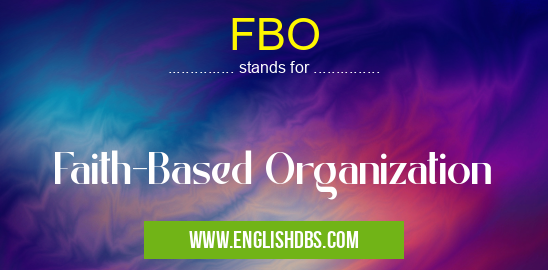What does FBO mean in CHURCHES
FBO (Faith-Based Organization) refers to a non-profit or charitable organization that is guided by religious or spiritual principles in its mission and activities. FBOs operate in various sectors, including social services, education, healthcare, and community development.

FBO meaning in Churches in Community
FBO mostly used in an acronym Churches in Category Community that means Faith-Based Organization
Shorthand: FBO,
Full Form: Faith-Based Organization
For more information of "Faith-Based Organization", see the section below.
FBO Meaning in COMMUNITY
FBOs play a vital role in strengthening communities by providing essential services and support to individuals and families. They often address social issues such as poverty, homelessness, addiction, and youth violence through faith-inspired programs and initiatives. FBOs foster a sense of belonging and purpose, promoting spiritual and communal well-being.
FBO Full Form
The full form of FBO is Faith-Based Organization. This term encompasses a wide range of organizations, including churches, mosques, temples, synagogues, and other religious institutions that engage in charitable and social service activities.
What Does FBO Stand for?
FBO stands for:
- Faith: FBOs are rooted in religious or spiritual beliefs and values.
- Based: Their missions and activities are grounded in those beliefs and values.
- Organization: They are structured entities with defined goals, programs, and leadership.
Essential Questions and Answers on Faith-Based Organization in "COMMUNITY»CHURCHES"
What is a Faith-Based Organization (FBO)?
An FBO is a nonprofit organization that is primarily motivated by religious beliefs and values. It may provide a range of services, such as social programs, education, and healthcare, in alignment with its faith.
What are the different types of FBOs?
FBOs can vary widely in their focus and activities. Some common types include churches, mosques, synagogues, faith-based charities, and religious schools.
How are FBOs different from secular organizations?
While both FBOs and secular organizations provide services to communities, FBOs are unique in their reliance on religious beliefs and values as the foundation for their mission and operations.
What are the benefits of working with an FBO?
FBOs often have strong community ties, a dedicated volunteer base, and a deep understanding of the needs of their target population. They can provide valuable resources and support to individuals and families.
What are the challenges faced by FBOs?
One challenge is ensuring that services are provided in a non-discriminatory manner, regardless of religious affiliation. Additionally, FBOs may face funding limitations or perceptions of bias in certain contexts.
How do FBOs contribute to society?
FBOs play a significant role in addressing social issues, providing essential services to vulnerable populations, and promoting community values. They contribute to the overall well-being and resilience of their communities.
Final Words: FBOs are essential partners in addressing social needs and promoting community well-being. They provide a unique blend of faith-based guidance, compassion, and practical support to individuals and families. Understanding the meaning and significance of FBOs is crucial for recognizing their valuable contributions to society.
FBO also stands for: |
|
| All stands for FBO |
